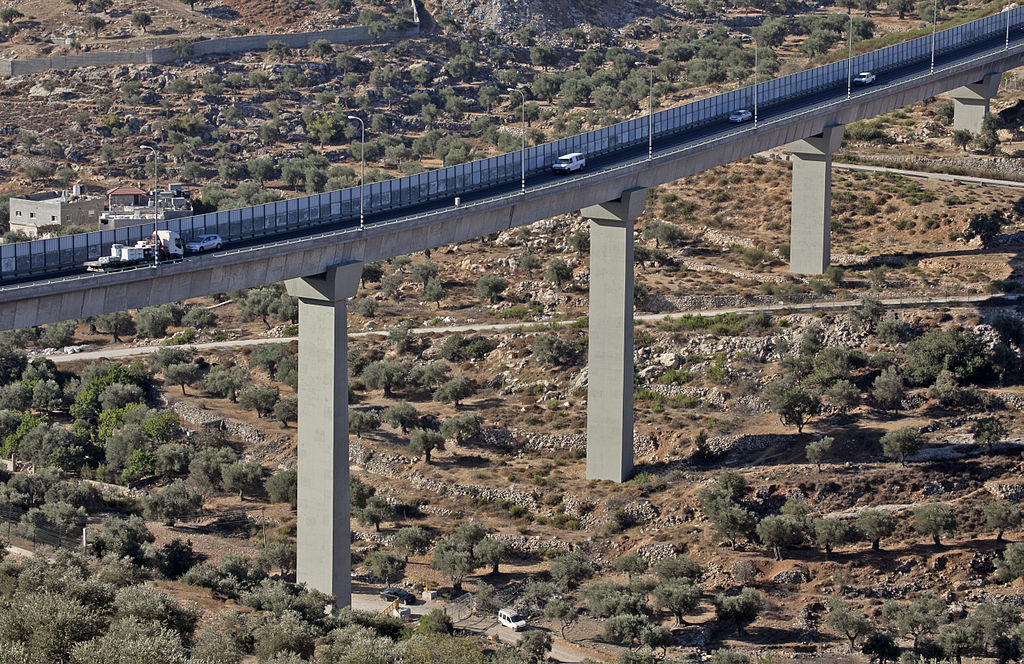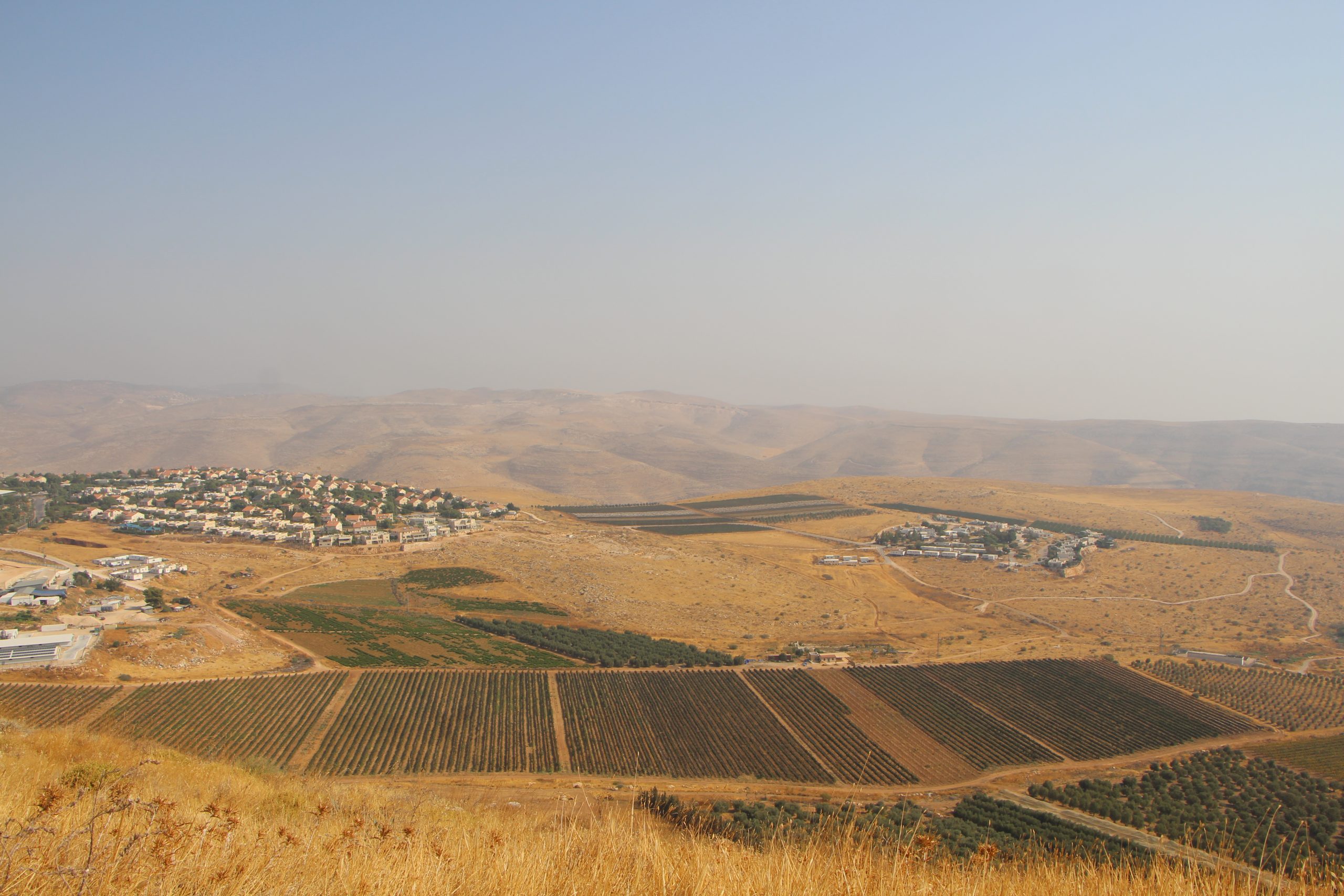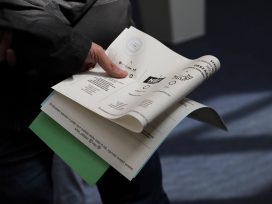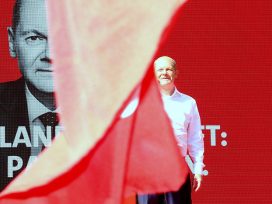Micha Brumlik: There have been considerable developments in the situation in the Middle East. Israel has moved closer to its former adversaries in the region, especially Saudi Arabia and the United Arab Emirates. This would have been all but inconceivable only a few years ago, and it has brought with it a shift in the balance of power in the region. And on taking office Joe Biden reaffirmed his commitment to the two-state solution, in contrast to his predecessor Donald Trump. We will discuss all of this in connection with Omri Boehm’s provocative observations about politics in Israel and Palestine and the prospects for peace. But first, let’s talk about the current political situation in Israel, where a general election will be taking place on 23 March – for the fourth time in two years. How do you expect these elections to turn out, particularly in light of Joe Biden taking office?
Moshe Zimmermann: The election is by all accounts already a done deal. The nationalists are going to win big, with more than 60 per cent of the vote it seems. The only unresolved question is whether Netanyahu can carry on governing – or whether someone from the right will replace him. That’s what is at stake in this election.
Omri Boehm: My expectations are much the same. The question is whether Netanyahu is re-elected, or else replaced by someone even further to the right. This poses a question for liberal Zionist parties, since not even the leftwing Zionist party Meretz has clearly stated that it will not enter a coalition with Gideon Sa’ar, Naftali Bennett or Avigdor Lieberman. Would they support these politicians of the extreme right to prevent a Netanyahu government? Would they confer legitimacy on their policies of occupation and annexation? On their racist laws? My fear is that they are remaining as vague as possible precisely because they are considering entering into just such a coalition. Most of their voters would put up with such a move, because their agenda consists solely of getting rid of Netanyahu.
Shimon Stein: In light of the systemic crisis that covers all facets of life – political, social and economic – and that is now even more obvious with Covid-19, it is all the more regrettable that Israel has for some time now had no leftwing option at all, and that society has been shifting in a broadly rightward direction.
The most we can hope for is that Meretz, historically so important, could get five seats out of 120, according to opinion polls; and even this seems a stretch. But could Meretz then operate as a relevant political force – for example in the coalition Omri has described? My view is that the party should resist such a move. Instead, it should emphasize its own identity even more powerfully. In these circumstances, we shouldn’t be getting our hopes up for a new dawn on 24 March.
Zimmermann: As I see it, the left’s attitude to the new coalition, or the new government, is of no consequence. The left has become so small that it hardly exists any longer. As Shimon has said, all that can still be called ‘left’ in Israel is Meretz. The Labour Party is a leftwing party only in a very limited sense. But even if we lump them all together and talk about an ‘Israeli left’, one thing is clear: it is far too small and far too insignificant.
In fact, the left can only choose between two evils: either it votes for the other rightwing parties, because they oppose Netanyahu – that means supporting a coalition with these parties. Or it continues working with Netanyahu, because they see him as merely a soft rightwing nationalist. But these are all questions that are very peripheral to political events. As far as the big decisions are concerned, they are irrelevant.
Boehm: As for the irrelevance of the Israeli Left, I don’t entirely agree with this assessment. Not because I see it as particularly strong or vigorous. But I have to cling to the hope that we can rescue a liberal left position in Israel. However, I am convinced that this is impossible as long as we stick to the old Zionist two-state policy. It can only happen if we fundamentally re-examine and modernize this policy. Indeed, there is still a relatively large group in Israel that would vote for non-nationalist parties: Arab voters. It may be disappointing to some that they are almost the only ones in a position to save Israel’s democracy. But it also offers reason for hope.
In the last election in March 2020, I had great hopes for the Joint List, the alliance between four chiefly Arab parties, and their possible cooperation with other forces. I very nearly flew from New York to Israel to vote for them. Even my father, the son of Holocaust survivors, who has been a liberal Zionist all his life, voted for the Joint List and not, for instance, for Meretz.
The recent developments with the Joint List don’t fill me with optimism. But I am still convinced that only through a partnership between a true Israeli Jewish Left, for instance the left wing of Meretz, and Arab politicians will it be possible for a stronger opposition to arise – a true opposition that does not merely cleave to old ideas but creates new ones. I realize that this is still far-fetched, but I’m not yet ready to give up all hope. Whereas Moshe sees the Left as largely irrelevant and Shimon advises it to strengthen its traditional identity, I argue that it can and should reinvent itself as a genuinely post-ethnic leftwing force.
Stein: The idea that Meretz could enter an alliance with the Arab list is more wishful thinking than reality. That being said, a power shift can only occur if we break the taboo among the majority of Israeli parties on entering into a coalition with the Arab list. This remains a problem for the majority of Israelis, and one that they will inevitably have to confront.
New start under Biden?
Brumlik: Israel is and always has been crucially dependent on the United States. Now there is a new president, who to all appearances does not support the policies of Donald Trump. Will this have an impact on Israeli politics?
Boehm: When it comes to Joe Biden, there are two critical questions. First: will he try to return to the old – and, in my view, meaningless – rhetoric of Obama and Kerry? I have no idea how many years they kept insisting that the window of opportunity to achieve a two-state solution was about to shut. If Biden leads US policy back to the language of international law and agreements, as he has announced, will he persist with these empty warnings? Or will he try to achieve real progress, and think about a different alternative to the two-state solution? Second, the Biden administration is under considerable pressure as a result of the nuclear deal with Iran, terminated by Trump. This pressure comes from Israel too.
Stein: The new US president is not a blank slate. We know him well; in a highly diverse Democratic Party, he represents the mainstream. He has already explained his attitude to Israel. This promises a certain continuity – but one with nuances.
In all this we should not forget that the Israel–Palestine conflict is absolutely not on Biden’s list of priorities. As we all know, he has plenty of other urgent issues to contend with: it is on those that he will ultimately be judged. These differing interests are particularly clear on the Iran issue: Israel feels directly threatened by Iran’s nuclear potential. The Americans, on the other hand, take a global view of this threat. The Biden administration has therefore decided to go back to the Iran deal. In this respect I do not imagine that there will be a new beginning in the Israel–Palestine conflict with Biden. But one thing at least is clear: Biden has shelved the ‘deal of the century’, Trump’s so-called peace plan for Israel and Palestine. And that in itself is a very positive shift.
Zimmermann: The questions of a new beginning under Biden and the attitude of the Arab Israeli parties can absolutely be linked. In both cases it is a question of priorities. Yet what has long been happening is the uncoupling of the Iran question from the Israel–Palestine question. This is also important for Netanyahu: he is betting everything on the conflict with Iran in order to avoid a resolution of the Israel–Palestine conflict.
If Biden intends to begin a new Middle East policy, his first priority has to be a peaceful resolution of the nuclear issue with Iran. This is the most relevant issue for the Arab parties in Israel, too. They are no longer primarily concerned with the Palestine-Israel question, and for the first time they are no longer unequivocally on the side of the Palestinians. The days of the Arab parties presenting a united front are over, something which has also been dictated by the recent agreements of a number of Arab states with Israel – and against Iran. The Arab parties are no longer clearly leftwing, which means that they are no longer natural allies of the leftwing Jewish parties in Israel. The whole situation has changed fundamentally, and rightwing nationalist politics in Israel has emerged as the clear victor.
Stein: The idea that the Iranian question can be linked to the Palestinian question is, with the greatest respect, nonsense. One has nothing whatsoever to do with the other. The Iranian issue has clear regional and indeed global relevance, whereas the Palestinian question is a dispute between two communities. Right now, there is no immediate threat of escalation in the latter case. Biden would be happy if he could avoid tackling the Palestinian issue altogether. We can expect a kind of crisis management from Washington, but not a broader conflict resolution.
Another thing also worth noting is that, for the time being, the Palestinian question is off the table for Israeli society, too. It played no role at all in the last Israeli elections. We continue to live in a state of self-denial: we think that if we ignore it, the problem will somehow take care of itself. In this sense, the whole thing has nothing to do with the Americans. This is why I always criticize Israelis for hoping for a kind of deus ex machina. We have been waiting for decades for the world to save us. But that is simply not going to happen.
Zimmermann: You are right. Of course these are two separate issues. From Netanyahu’s point of view – and this is his greatest triumph – the Iran issue has been a way to push the question of Palestine to one side. It is in this sense – and this is what I meant – that both issues are interlinked, coupled together. The key issue is Iran, and Palestine is irrelevant in comparison. This is how Netanyahu has been able to continue his settlement policy undisturbed – even by the Americans.

West Bank, Near Giloh, Jerusalem, the Tunnels Road Photo by zeevveez from Jerusalem, CC BY 2.0, via Wikimedia Commons
Alternatives to the two-state solution
Brumlik: Let’s go deeper into the subject of Israel and Palestine. This summer will mark 54 years since the state of Israel occupied the West Bank in the Six-Day War of 1967. If my understanding of the politics of the late 19th and 20th centuries is correct, there has never been such a long period of occupation, anywhere. The question is whether the so-called ‘developments on the ground’, the Jewish settlements on the West Bank, even allow for anything approaching a two-state solution, or whether that is nothing more than empty rhetoric. This would be an appropriate point at which to recall the demand of Palestinian philosopher Sari Nusseibeh some years ago: ‘Just go ahead and annex us!’ Omri Boehm has recently published a remarkable book in which he revives an appeal made by Martin Buber: ‘One country, one state and two peoples’. Omri, can you please outline your programme?
Boehm: Well, since Shimon has already accused me of wishful thinking, I’d like to start off by saying this…
Stein: Please don’t take it personally!
Boehm: Not in the least! I only say this so that people will understand where I’m coming from: wishful thinking is not simply wishful thinking. If we want to be rational, we have to allow ourselves to tell the truth and to talk openly about possibilities, even if they seem far-fetched. When people talk about wishful thinking, that often has less to do with reality than with positions of power – in other words, clinging to solutions that seem comfortable to those in power, even if they are ultimately no solutions at all. This is exactly what liberal Zionists are guilty of when they dismiss alternatives to the two-state solution as ‘wishful thinking’.
My first argument is that the concept of a Jewish and democratic state is a contradiction in terms. The idea of a Jewish democracy arose from the desire to establish a Jewish state after the Holocaust, and in the late 1940s was entirely understandable. But according to the current definition of a liberal democracy – even a minimal one – this is a contradiction. The reason for this, put simply, is that democracies assert the sovereignty of their citizens, whereas the Jewish state asserts the sovereignty of the Jewish people. If in the 21st century we want to establish a democratic Zionist policy and be able to justify it, we will have to change our concept of Jewish democracy. Shimon spoke just now about the fact that the Jewish majority – even Meretz – is unhappy about the very notion of working with the Arab Israelis. This is a direct consequence of how the concept of Jewish sovereignty is understood – and shows why we have to get beyond it.
The following needs to be understood: the two-state solution is finished. This is not only – as is often wrongly assumed – because of the numerous Jewish settlers in the West Bank. The real reason is that in this geographical entity that lies between Jordan and the sea there is a Palestinian majority of 53 per cent – and yet even the most ‘generous’ two-state solution offers only around 20 per cent of the land to this majority. And here we are not even talking about a contiguous territory. I haven’t even mentioned the hundreds of thousands of settlers who live in the heart of the region and are not, if we are honest, going to be resettled. The ‘compromise’ that we criticize the Palestinians for rejecting, is – in the words of philosopher Avishai Margalit – ‘rotten’; it has no real prospect of being accepted by more than 50 per cent of the population. So we have a duty, indeed an imperative, to think beyond the two-state solution.
Brumlik: Is the Israeli left trying to do this, in your opinion?
Boehm: One reason for the weakness of the Israeli left is that it has no viable political programme. Voters know that the two-state solution is finished, but the Left offers them no alternative concept of citizenship or peace. Not so the Right! They are systematically moving in a direction of annexation, apartheid and even expulsion. Trump’s ‘deal of the century’ also talked about the expatriation of Arab Israelis and received encouragement from Israel’s political centre as a result. We can see how this kind of politics is re-entering the mainstream of Israeli politics. This will be the rightwing alternative to the two-state solution.
If on the other hand we start thinking about a federation instead of a two-state solution, then this is neither anti-Zionist nor post-Zionist. This is an important point. If we look at the deeper roots of Zionism, we find not only Martin Buber, whom Micha quoted earlier. In some ways Buber is actually a dangerous point of reference, since he is seen as a dyed-in-the-wool leftwing Utopian – which is why I try not to refer to him too often. But Vladimir Ze’ev Jabotinsky, the founder of revisionist Zionism, also thought along these lines. By the middle of the 1930s, even David Ben-Gurion, who became Israel’s first prime minister, was doing likewise.
The Zionist concept was originally about self-determination, not sovereignty. Here I think of self-determination in the context of a binational federation with the Palestinians. We need only think of Menachem Begin’s 1977 plan. Many people have long since forgotten it, and many who still remember it would rather forget what it contained. Begin, as is well known, offered the Palestinians autonomy in the West Bank and the Gaza Strip. This is why it was known as a plan for autonomy, although it actually allowed for a federation within a state, albeit not a perfect one. The plan offered the Palestinians in the West Bank and Gaza Strip full citizenship, full economic rights and both active and passive voting rights – the right both to vote and to stand for election – in the Israeli parliament. Begin linked self-determination for the Palestinians in the West Bank and Gaza Strip with their role as citizens of the State of Israel. The latter is the very essence of the plan, far more important than the issue of autonomy.
It is true that these people could be given sovereignty even in a Jewish state. But this very action would push the boundaries of what is understood by Jewish sovereignty beyond its usual definition. This is the reason why not even leftwing liberal writers such as David Grossman or Amos Oz could contemplate granting the Palestinians citizenship – because according to their conception, the Jewish state guarantees the sovereignty of the Jewish people. This is why relatively few Palestinians are allowed to receive Israeli citizenship.
Can we return to something similar to the Begin plan today? For what it’s worth, 64 members of the Knesset were in favour of it, 40 abstained and eight voted against. I would like to put a comparable democratic alternative to the two-state solution back on the agenda today.
Zimmermann: In principle it is not a question of ‘either… or’. In my opinion, the two-state solution can continue to exist and be successful. And in the same breath I would argue for a federal, or confederal solution.
It is clear that the foundational principle behind the existence of the state of Israel is the right of the Jewish people to self-determination. But since the land of Palestine or ‘Eretz Israel’ is inhabited not only by the Jewish people, but also a people that call themselves Palestinians, this people must also be guaranteed the right to self-determination. This is the position we start out from. We are in favour of every people being allowed the right to self-determination.
The Oslo accords of 1993 were an expression of the wish that this could succeed. Yet even at the time, it was clear that this concept of largely ethnically homogeneous nation states, as were aspired to in 19th-century Europe, could not be achieved in the case of Israel and Palestine. The moment you accept the right of Palestinians to self-determination, you must then take the next step and create a kind of federation or confederation.
We cannot be dogmatic with the two concepts we are using here. First, the concept of the state cannot be understood as it was in the 19th century or at the end of the First World War. Second, the concept or description ‘Jewish’ can mean something quite different from the purely ethnic dimension. Unfortunately, that is precisely how it is currently used in Israel. If we broaden our understanding of the concept, it is absolutely possible to be both Jewish and liberal.
Micha Brumlik mentioned Martin Buber. Buber identified these alternatives a hundred years ago: either this Jewish state will become a Jewish Albania – meaning ethnically cut off, something he did not support – or it would become a centre of world culture. But what is currently emerging – a Jewish Albania in the heads of Israeli politicians – is something that we have to get beyond. This is utopian right now, but in principle, it is possible.
The great example is the European Union. Its member states have not been broken up; they continue to exist. But there is a federal, or confederal construct that is called the EU. Something similar could be implemented in the Middle East. There are also ways of adding greater, regional freedom to the structure at a lower level. Once we start thinking along these lines, we have all the ingredients we need: we have recognition of the right to national self-determination on both sides; in principle we have accepted two states and in practice the federal development follows, which can build on the autonomy of both peoples within this new structure.
How democratic can a Jewish state be?
Stein: But federations and confederations are two different structures and concepts. A confederation presupposes that the Palestinians are an independent state. For only then can they take the decision to be affiliated within a confederation. This presupposes independence on their part, even if it only lasts for a minute. A federation, by contrast, is something different: it is a single state, organized in federal form – this is the important difference between the two structures.
Unlike Omri, I continue to make the case for a two-state solution. All other alternatives give rise to higher costs that I am not willing to pay. Quite apart from that, I am not aware of a single example anywhere in the world where a messed-up reality such as we now see has given way to a successful coexistence. So I continue to argue for separation between the Israelis and the Palestinians. Once this has been in place for some time and both sides take the view that other structures can be considered, then we can start thinking about them. But first of all, I believe that a separation is the best thing – however painful it may be. The Israelis must be clear about that, and I think that this discussion is something that has been notably absent for a long time.
Nor do I share Omri’s view that the concept of a Jewish and democratic state is a contradiction in terms. In fact, he goes further and talks about the abolition of Zionism. As a Zionist I continue to believe, as Moshe has just said, in the right of a people to self-determination – and this applies to the Palestinians too. Within all this we can and must continue to debate concepts such as democratic, liberal and Jewish. There is no single definition of these three concepts, and I can very well imagine that it is possible to be both Jewish and a liberal democrat.
Boehm: I would like to say something about the idea, often expressed, that we have to achieve a certain level of maturity before we can introduce political change. This is indeed true, but maturity does not simply come with time. In order for something to mature, we have to talk about it: we have to confront our own history; we have to acknowledge our mistakes; we have to talk about the fundamental injustices in our society. Because we don’t just achieve progress as time marches on. For example, will we ever have ‘the right moment’ for a federation or confederation, if even public intellectuals of the stature of David Grossman do not reflect on the fundamentals of their own thinking and recognize their mistakes, such as the concept of Jewish democracy? If we do not discuss these questions openly, we may never be in a position to lead a new generation towards a different kind of politics.
I am not inclined towards relativism when it comes to concepts such as liberalism and democracy. Their meaning may be changeable and flexible, but we should take care to remain truthful when interpreting their definitions. When discussing Judaism, we should be clear about what it can be and whether it has to be understood in an ethnic sense. Only on this basis will we be able to establish whether a Jewish state can be a liberal democracy. Then the question arises whether we want the younger generation to continue to support this concept of a Jewish state, and whether mainstream thinkers – and not just radical leftists and anti-Zionists – should reconsider this concept.
As an aside, Shimon, you said earlier that I was in favour of the ‘abolition of Zionism’. That’s not true. I know that many people want to interpret me that way, but my intention is the opposite, in that I am trying to show that we should conceive of Zionism in a way that is compatible with liberal democracy.
Stein: And yet you write ‘Zionism is a political agenda that has its roots in the rejection of liberal politics.’ What do you mean?
Boehm: I distinguish between Zionism as we now know it, which is founded upon the concept of a Jewish state, and a Zionism that is not based on this ethnic concept, but that can be defined as a desire for self-determination, not for sovereignty. Jewish sovereignty contradicts the principle of liberal democracy, whereas Jewish self-determination does not. This distinction was important to the original Zionists, and I have sought to revive it in my book. I am not arguing that Zionism should be ‘abolished’ – on the contrary. If in the future we want to pursue a Zionist democratic policy, we have to liberate Zionism from an ethnic conception. You seem to assume that Zionism must be ethnic. I don’t.
Moshe on the other hand said that Jews need not be understood as an ethnic group, and so a non-ethnic Jewish state would be conceivable. I find that implausible. If we view Jewishness purely through the prism of universalism, we don’t get a Jewish state, we get a neutral one. Yet we are talking about a nation, about the idea of a particular form of national self-determination, that is clearly not universal – it is Jewish.

Israeli outpost in Mateh Binyamin Regional Council Photo by דוידוד, CC BY-SA 4.0, via Wikimedia Commons
The right of return
Brumlik: Have you had any reactions to your manifesto from the Palestinian side? And how does the issue of the Law of Return – Chok Ha-Schwut – fit into your agenda?
Boehm: So far there hasn’t been much feedback from my proposals from the Palestinian side. But of course, these ideas of a federation exist; I am very far from the first to make such a suggestion. There are activists in Israel who are interested in and engaged with such concepts. I have the impression, although I can’t back it up with statistics, that the younger generation of Palestinians prefers to talk about civil rights than national rights. This is not an explicit response to my ideas, but at least follows a similar direction to my arguments.
I am no great fan of Chok Ha-Schwut, but I understand its roots in history. Today’s Law of Return is based on the idea that Israel is a Jewish state and that every Jew has the right by birth to acquire Israeli citizenship. I understand the sensitivity with regard to Jewish history and respect the right of every Jew who is in need to come to Israel. What we should not accept, however, are statements of the kind made by Naftali Bennett, doubtless speaking for many others: that the Jewish state belongs to a Jew in Brazil more than it does to an Arab in Galilee. We must dismantle this purely ethnic concept of sovereignty. This does not mean that in a federation that assures self-determination for both Jews and Palestinians there cannot be a right of return. But it must be understood differently.
Zimmermann: Chok Ha-Schwut is a good example of how equal rights can be achieved. If Jews automatically have the right to return, to Palestine, or to Israel, then should Palestinians not have the same right – right of return for Palestinians to the territory that is known as Erez-Israel/Palestine? The difference is between principle and practice: once we have accepted the right of return for both Israelis and Palestinians in principle, we can and must work out a way to implement it in practice.
The concept ‘Jewish state’ can be interpreted in many different ways. But the important thing is how we create something constructive from the definition. The ethnic element of Jewishness then becomes secondary, or less relevant. Paramount to the question of Jewishness is the Jewish idea and the Jewish tradition – however this tradition is understood. Here we have a very flexible concept of state, of nation state, of the role of ethnicity; and then of course any ‘resolution’ through transfer or expulsion becomes irrelevant.
Stein: In principle I agree with Moshe as regards the right of return: if we grant ourselves as Jews the right of return, then we must grant the same right to the Palestinians. It would be wrong to demand something for myself that I then deny to Palestinians. The question then has to be: return to where? That is the real question, and not whether Palestinians have that right. But that is a political question.
I would like to take up another word mentioned by Moshe: flexibility. We have to show a great deal of creativity, flexibility, tolerance and readiness to compromise. Life is dynamic and we cannot take pure theory as our benchmark. Yes, we must keep our plan in mind, but in the knowledge that reality will end up looking different.
Boehm: That’s right: we always have to live and act in the here and now, particularly given the explosive situation in the region. But at the same time, we need a laboratory to develop ideas. Here our imagination must be guided from an honest appreciation of where we have to go – and not where we have come from. This involves having to talk seriously about the question of citizenship. In all this we have to recognize something important: in a Jewish state where the Jewish people is sovereign, there can be no equality between Jews and non-Jews. And this contradicts the very idea of a democracy.
Zimmermann: This is why we do not accept this definition of a Jewish state.
Boehm: Great. But I don’t know who this ‘we’ is. You and I are agreed on this point. But Shimon is more closely aligned with people who are considered liberal Zionists, such as David Grossman and Michael Walzer. I think we’ve reached an impasse as a direct result of this concept of statehood. We need a sovereign state, but one that renounces certain parts of its sovereignty. A sub-sovereign unity that is part of a greater community.
Zimmermann: Europeans call that subsidiarity.
Boehm: Of course. But the EU is merely a confederation, not a federation. We have just seen an EU member leave the union, as is possible in a confederation. In a federation, we would have a common citizenship, shared sovereignty and a legislative bound to the constitution. Citizens on both sides of this federation would be equal. The Arab-Israeli member of the Knesset, Ahmad Tibi, is sometimes quoted as saying that ‘Israel is a Jewish democracy. It is democratic for the Jews and Jewish for the Arabs.’ But a Jewish state is not democratic even for itself. A democratic state must be neutral.
Stein: Not necessarily. A liberal state must, according to your definition, be neutral, but this is not the case for a democratic state in the narrower sense.
Boehm: I would go even further than you. Neither a liberal nor a democratic state have to be neutral. But on the question of ethnicity, a state must be neutral, if it wants to be democratic and liberal. The key role of a democracy is to ensure the sovereignty of its citizens. And citizenship must be understood as a neutral concept.
Stein: We can of course distinguish between a formal and a substantive democracy. We can also discuss the concept of a limited democracy, but then we will get lost in a discussion about definitions. Don’t be so categorical. With you it seems as though your way is the only right one.
Boehm: On this question I am categorical. A state in which not all citizens are equal regardless of their ethnicity is not a democratic state. We should agree on this. Ruth Gavison and others have attempted to square the circle. Yet the future of Israel depends on fighting for democracy, not on changing the meaning of that concept. What happens if a state calls itself a democracy, but this only applies to whites? Is that a democracy?
Zimmermann: At least we are agreed that we are opposed to an ethnocracy – a word that has already been doing the rounds in Israel. The American constitution is not neutral towards religion – it simply assumes that religion can have no influence on the equal rights of all citizens. The same is true of the question of ethnicity in Palestine and Israel. We know there are two ethnic groups, but that has nothing to do with equal rights, nor can it be activated against equality. The concept of ‘Jewish democracy’ is as unfounded as ‘German physics’. There is such a thing as physics, but it can’t be specifically German.
We talk about the extent to which the population is liberal or can think liberally. There is nothing stopping Israel being a liberal state; nothing preventing a Zionist from thinking like a liberal. The problem is that there are people who do not have a liberal perspective at all – who are not liberal – and they are in the overwhelming majority. That is what we are up against.








